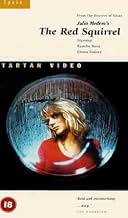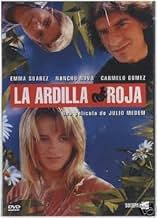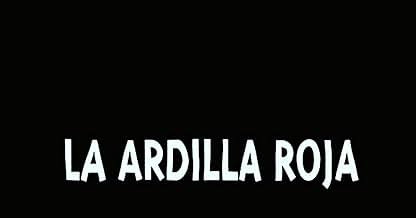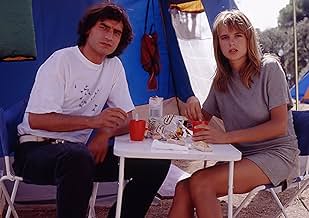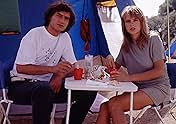IMDb-BEWERTUNG
7,1/10
4998
IHRE BEWERTUNG
Füge eine Handlung in deiner Sprache hinzuA suicidal, has-been rock star tells an amnesiac woman they are longtime lovers after he witnesses her crash her motorcycle.A suicidal, has-been rock star tells an amnesiac woman they are longtime lovers after he witnesses her crash her motorcycle.A suicidal, has-been rock star tells an amnesiac woman they are longtime lovers after he witnesses her crash her motorcycle.
- Auszeichnungen
- 12 Gewinne & 5 Nominierungen insgesamt
Susana García Díez
- Eli
- (as Susana García)
Empfohlene Bewertungen
Lisa (Emma Suarez) is in a motorcycle accident and loses her memory. Jay (Nancho Nova) finds her and calls the ambulance. He then pretends to be her boyfriend, convincing her and the doctors of this. They disappear on holiday together to the Red Squirrel camp site where memories steadily flow out and all is not what it seems.
This starts innocently - you're pretty sure that you understand what's going on (Jay is trying to replace his lost girlfriend by naming this lose woman that she is his Lisa and giving her all the memories he wants). However as the film goes on it becomes less clear. The director fills the film with flashbacks of Jay's memories of his girlfriend and his music video, and flashbacks of Lisa's memories combined with a squirrel eyes view of the forest.
As the film continues these flashbacks etc are continually intercut with the main film and separate elements (the hit and run driver, the night time radio slots, the doctor) all get tied into the main story. During the film it's all very exhilarating because you don't fully understand what's going on but you know that all the elements are coming together towards an amazing conclusion. Unfortunately it doesn't deliver at the end - as the strands start to come together the film does start to link up - but it links up with unbelievable, coincidental connections. Rather than having a thrilling tidy conclusion in collapses into symbolism and abstract images and actions.
Emma Suarez steals the show as the complex Lisa, she manages to be believable even when the other actors and surrounding situations seem ridiculous. The director does an excellent job injecting a sense of urgency and confusion into a seemingly straight forward story. Although it does being meaningless arty rubbish in the last 20 minutes, everything that goes before is a consistently visually amazing story.
This is definitely worth watching once - but the final 20 minutes will either frustrate you (if you like logical meaningful endings) or amaze you (if you're into abstract arty stuff!).
This starts innocently - you're pretty sure that you understand what's going on (Jay is trying to replace his lost girlfriend by naming this lose woman that she is his Lisa and giving her all the memories he wants). However as the film goes on it becomes less clear. The director fills the film with flashbacks of Jay's memories of his girlfriend and his music video, and flashbacks of Lisa's memories combined with a squirrel eyes view of the forest.
As the film continues these flashbacks etc are continually intercut with the main film and separate elements (the hit and run driver, the night time radio slots, the doctor) all get tied into the main story. During the film it's all very exhilarating because you don't fully understand what's going on but you know that all the elements are coming together towards an amazing conclusion. Unfortunately it doesn't deliver at the end - as the strands start to come together the film does start to link up - but it links up with unbelievable, coincidental connections. Rather than having a thrilling tidy conclusion in collapses into symbolism and abstract images and actions.
Emma Suarez steals the show as the complex Lisa, she manages to be believable even when the other actors and surrounding situations seem ridiculous. The director does an excellent job injecting a sense of urgency and confusion into a seemingly straight forward story. Although it does being meaningless arty rubbish in the last 20 minutes, everything that goes before is a consistently visually amazing story.
This is definitely worth watching once - but the final 20 minutes will either frustrate you (if you like logical meaningful endings) or amaze you (if you're into abstract arty stuff!).
10Phroggy
Yours truly has seen lots and lots of movie, but very few impressed me with sheer intelligence as this one - a gem where you feel every single shot has its real meaning and, more important, the filmmaker think his audience is clever enough to understand what's going on without having it rammed in his/her face. When you only know the title and doesn't know a thing about the plot (as I did when I saw this one at the Gérardmer film festival), you feel stunned, aghast, thrilled, surprised, and then you settle for the ride. Comedy, wit, intelligence (again), romance, mystery, emotion, this one has everything that makes us love movie. Unless you only want special effects and billion-dollars no-brainers, I can't see how this movie can fail to ignite passion. If there actually is justice in this world, Julio Medem will someday be recognised as maybe the most underrated filmmaker of our times - and he hasn't said his last word yet. A masterpiece to be enjoyed again
and again
and again
Julio Medem's 'La Ardilla Roja' follows the same path of surrealism as his previous film 'Vacas'. Intricately layered and open to interpretation, Medem's films are a class of their own. Of course he is influenced by many great filmmakers like Hitchcock, Buñuel and the Coen Brothers, to name a few, and artists like Salvador Dalì and he is not ashamed to show it in his unique films. The story starts off simple enough and then it progresses into something more complicated entangling itself in a psychological drama, a mystery thriller, dark comedy, erotica and surrealism. While the likes of Almodovar have gained recognition in the world cinema circuit, I wonder why Julio Medem still remains less known.
Made with a modest budget, 'La Ardilla Roja' is skillfully executed. The cinematography, lighting and visuals create a very recognizable world and yet the way it's presented contributes to the element of surrealism. The score is used efficiently and the acting is superb, especially that of Emma Suárez, Nancho Novo and María Barranco.
His proceeding releases only prove that Julio Medem is getting better and better with each film. 'La Ardilla Roja' is not one to be missed
Made with a modest budget, 'La Ardilla Roja' is skillfully executed. The cinematography, lighting and visuals create a very recognizable world and yet the way it's presented contributes to the element of surrealism. The score is used efficiently and the acting is superb, especially that of Emma Suárez, Nancho Novo and María Barranco.
His proceeding releases only prove that Julio Medem is getting better and better with each film. 'La Ardilla Roja' is not one to be missed
Intense as well as offbeat/intriguing drama with top-notch acting , superb photography and sensitive soundtrack . This brooding picture contains a magnificent performance by a beautiful woman , Emma Suarez , and a good support cast full of prestigious players giving right performances . It deals with Sofia (Emma Suarez) who suffers a motorcycle accident and loses her memory . Jota (Nanco Novo) is a musician, (Susana Gimenez) affected when misses his girlfriend , as he witnesses a motorcycle accident . When he meets Sofia who suffers amnesia , he then takes advantage of the deeds and reinvents her name as Lisa and her life according to his desires . Sofia/Lisa impacts on a great scale about Jota's life . As he makes up a name for her and tells the doctors (Ana Gracia , Txema Blasco , Cheta Lera) that they live together as a couple for several years . Later on , they go to a holiday camping and become involved with a couple called Antón (Karra Elejalde), a cabman , Carmen (María Barranco) and their children . After that , there appears a strange character named Felix (Carmelo Gómez) related to her .
Spanish production with fine acting , colorful cinematography , excellently interpreted and rousing score by Alberto Iglesias . Julio Medem directed the film for Sogetel and producer Enrique López Lavigne and it was released in 1993 . Set in San Sebastian or Donostia and at a lagoon in Pelayos De Presa , this interesting and thought-provoking film dealing with a story of solitary people , as a strange , unsettling young , well played by Nancho Novo , desperate after separating from his girlfriend , as well as a twenty-five-years-old girl riding a motorcycle and falling off a bridge , subsequently suffering amnesia , being splendidly performed by Emma Suarez . The picture was considered by the prestigious ¨Daily Telegraph¨ : as taut and intricate as anything by Alfred Hitchcock . This is a thrilling , exciting , deliberate though magnetic drama . It contains marvelous photography , breathtaking musical score and enjoyable production design . It is a riveting film though sometimes a little boring , slow-pace and overlong . Anyway, the film is interesting , thematically intriguing and strange ; Medem has his own style of telling a story . Very good support cast such as Maria Barranco , Chete Lera , Cristina Marcos ,Txema Blasco , Ana Gracia , Monica Molina and Karra Elejalde , Julio Medem's ordinary . Thrilling as well as sensitive musical score mirroring well the scenery, its people and the story line, it was superbly composed by several times Oscar nominated Alberto Iglesias , Julio Medem's usual . In addition , a spotless pictorial cinematography by Gonzalo Fernandez and a willingness , almost perfect of the elements of each shot , every sequence , every space ; being rightly filmed on location in Pelayos De la Presa, El Pardo , San Martín Valdeiglesias, Madrid, Usanos, Guadalajara and San Sebastián, Guipúzcoa, País Vasco .
The motion picture was well produced by Fernado Garcillan and originally directed by Julio Medem ; this his second movie, "Ardilla Roja" or ¨The red squirrel¨ released in 1993, was selected for the Cannes Film Festival and it confirmed Medem's talents and won prizes in Fort Lauderdale, Bogota and Bucarest . Medem had been making short movies with a super-8 camera owned by his father until he received a call from a new production company called Sogetel and executive producers Fernando de Garcillán , José Luis Olaizola , Enrique López Lavigne . They were interested in his script titled "Vacas" . It won the Goya Award from the Spanish academy for best new director, and won prizes in the festivals of Tokyo, Torino and Alexandria. In 1998 Medem released " The lovers of the Polar Circle ," considered his best movie by most of his fans . It also became a box-office hit with more than one million spectators in Spain and was also released worldwide. In 2001 his fourth movie, "Lucia and sex ," became a huge hit and began the career of actress Paz Vega who won the Goya for best new actress . Although in 2003 failed with the release , "The Basque ball" , a documentary that portrays the phenomenon of nationalism and terrorism in the Basque Country of northern Spain , it was very polemical and partial . In 2007 directed the flop ¨Caotica Ana¨ and in 2010 , ¨Room in Rome¨, a successful though with not sense film , plenty of nudism and only starred by two gorgeous naked girls . Julio Medem is for sure one of the the most important and original Spanish filmmaker. Well worth watching if you get the chance .
Spanish production with fine acting , colorful cinematography , excellently interpreted and rousing score by Alberto Iglesias . Julio Medem directed the film for Sogetel and producer Enrique López Lavigne and it was released in 1993 . Set in San Sebastian or Donostia and at a lagoon in Pelayos De Presa , this interesting and thought-provoking film dealing with a story of solitary people , as a strange , unsettling young , well played by Nancho Novo , desperate after separating from his girlfriend , as well as a twenty-five-years-old girl riding a motorcycle and falling off a bridge , subsequently suffering amnesia , being splendidly performed by Emma Suarez . The picture was considered by the prestigious ¨Daily Telegraph¨ : as taut and intricate as anything by Alfred Hitchcock . This is a thrilling , exciting , deliberate though magnetic drama . It contains marvelous photography , breathtaking musical score and enjoyable production design . It is a riveting film though sometimes a little boring , slow-pace and overlong . Anyway, the film is interesting , thematically intriguing and strange ; Medem has his own style of telling a story . Very good support cast such as Maria Barranco , Chete Lera , Cristina Marcos ,Txema Blasco , Ana Gracia , Monica Molina and Karra Elejalde , Julio Medem's ordinary . Thrilling as well as sensitive musical score mirroring well the scenery, its people and the story line, it was superbly composed by several times Oscar nominated Alberto Iglesias , Julio Medem's usual . In addition , a spotless pictorial cinematography by Gonzalo Fernandez and a willingness , almost perfect of the elements of each shot , every sequence , every space ; being rightly filmed on location in Pelayos De la Presa, El Pardo , San Martín Valdeiglesias, Madrid, Usanos, Guadalajara and San Sebastián, Guipúzcoa, País Vasco .
The motion picture was well produced by Fernado Garcillan and originally directed by Julio Medem ; this his second movie, "Ardilla Roja" or ¨The red squirrel¨ released in 1993, was selected for the Cannes Film Festival and it confirmed Medem's talents and won prizes in Fort Lauderdale, Bogota and Bucarest . Medem had been making short movies with a super-8 camera owned by his father until he received a call from a new production company called Sogetel and executive producers Fernando de Garcillán , José Luis Olaizola , Enrique López Lavigne . They were interested in his script titled "Vacas" . It won the Goya Award from the Spanish academy for best new director, and won prizes in the festivals of Tokyo, Torino and Alexandria. In 1998 Medem released " The lovers of the Polar Circle ," considered his best movie by most of his fans . It also became a box-office hit with more than one million spectators in Spain and was also released worldwide. In 2001 his fourth movie, "Lucia and sex ," became a huge hit and began the career of actress Paz Vega who won the Goya for best new actress . Although in 2003 failed with the release , "The Basque ball" , a documentary that portrays the phenomenon of nationalism and terrorism in the Basque Country of northern Spain , it was very polemical and partial . In 2007 directed the flop ¨Caotica Ana¨ and in 2010 , ¨Room in Rome¨, a successful though with not sense film , plenty of nudism and only starred by two gorgeous naked girls . Julio Medem is for sure one of the the most important and original Spanish filmmaker. Well worth watching if you get the chance .
Julio Medem is something of an underrated figure within the spectrum of world cinema. He regularly produces bold, imaginative and exciting films that shatter the usual preconceptions we might have of the limitations of cinematic language and storytelling in the visual sense, as well as presenting an incredibly intelligent and original approach to the ideas of production design, editing and cinematography. Despite this, however, he has yet to be fully acclaimed universally as a great filmmaker in the tradition of Tarkovsky, Bergman, Hitchcock, Kubrick, Godard, Welles etc - or even ranked alongside contemporary cinematic figures such as Pedro Almodóvar, Lars von Trier, Aki Kaurismäki, Michael Haneke and Guillermo Del Toro. The Red Squirrel (1993) was only Medem's second feature following the elliptical historical satire Vacas (1991) and yet, even now we can already see the themes from that particular film being further developed in preparation for the later, perhaps even great films, such as Tierra (1996), The Lovers of the Arctic Circle (1998) and Sex and Lucia (2001).
Like those films, The Red Squirrel is a multi-layered work rife with possible interpretations and elements of broad, Buñuelian surrealism that are at odds with the more recognisable presentation of reality established in the film's intriguing first half. On our initial viewing the plot can seem incredibly straightforward, revolving around the strange relationship between a suicidal former pop star and the mysterious, amnesiac woman who literally falls into his life. With this section of the film, Medem creates a truly unique modern-day thriller, building on elements of Hitchcock - most noticeably Vertigo (1957), with its iconographical depictions of mysterious blondes, shadowy villains, damaged heroes and seething paranoia - but intelligently subverting them by way of elements as diverse as Salvador Dali, the aforementioned Buñuel, low-budget B-movies, The Road Warrior (1980), elements of magical realism and ideas central to the Basque regional identity; again, drawing parallels with the hypnotic and self-reflexive world of Vacas. These subtle editions compliment the more recognisable characteristics of the romantic-thriller mystery story at the heart of the film to create something that is much more engrossing, enticing, and unique.
As the story progresses and we are drawn ever deeper into the film's central mystery, we begin to note the emergence of further plot influences, such as psychological horror, melodramatic eroticism, heart-stopping suspense, black comedy and eventually full-blown surrealism. As it does, the film then becomes much more complex, taking on issues of love, sexuality, mental and physical manipulation, mind-games and cinematic role-playing. Medem ties the whole thing together with some wonderful set pieces and a staggering use of cinematic style put together on an obviously limited budget. It isn't purely the imagination and intelligence of Medem that impresses us though; with every wild narrative U-Turn or directorial flourish - incorporating everything from Kiss Me Deadly (1955) to Raising Arizona (1987) - being backed up by the fine performances from lead actors Nancho Novo and Emma Suárez, both of whom manage to makes us care an enormous amount about these two protagonists and the relationship that forms between them.
Although it's always tempting to say that both Medem and his work is unlike anything else you will ever see; I think there are some obvious reference points here, many of which have been mentioned above, as well as a certain similar approach to filmmakers such Krzysztof Kieslowski - with the deep, meditative and vaguely hypnotic use of camera combined with the intricate presentation of a narrative driven by the purely psychological; most apparent for example in his epic TV series Dekalog (1989) and one of his greatest films, The Double Life of Veronique (1991) - and especially a filmmaker like Wong Kar-Wai, with the idea of the lead character's enigmatic pop song describing the narrative and the central location manipulating the story so as to take on more self-reflexive, metaphorical notions being very much in keeping with films such as like Happy Together (1997), In the Mood for Love (1999) and 2046 (2004).
As with much of Medem's work, including the 2001 erotic mystery thriller Sex and Lucia, the film uses much in the way of cinematic coincidences, with the various coincidences that form the basis of the plot acting as clues to the narrative. This turns the film into a wonderful example of cinematic storytelling, creating a real mystery for the audience in which all the pieces fall perfectly into place during the film's final act, but still leave us room for interpretation. Without question, this is a delightful cinematic experience that goes way beyond the limitations of film; elaborating on some of the complex ideas regarding narrative, time, character and spirit presented in Vacas, whilst simultaneously foreshadowing the ideas of escape, transcendence, imagination, eroticism and the notion of a story being written as it goes, which will all be further developed in Sex and Lucia. With this in mind, The Red Squirrel is an absolute marvel; an epic, ornate jigsaw-puzzle for the audience, and - without question - one of the greatest films of the 1990's.
Like those films, The Red Squirrel is a multi-layered work rife with possible interpretations and elements of broad, Buñuelian surrealism that are at odds with the more recognisable presentation of reality established in the film's intriguing first half. On our initial viewing the plot can seem incredibly straightforward, revolving around the strange relationship between a suicidal former pop star and the mysterious, amnesiac woman who literally falls into his life. With this section of the film, Medem creates a truly unique modern-day thriller, building on elements of Hitchcock - most noticeably Vertigo (1957), with its iconographical depictions of mysterious blondes, shadowy villains, damaged heroes and seething paranoia - but intelligently subverting them by way of elements as diverse as Salvador Dali, the aforementioned Buñuel, low-budget B-movies, The Road Warrior (1980), elements of magical realism and ideas central to the Basque regional identity; again, drawing parallels with the hypnotic and self-reflexive world of Vacas. These subtle editions compliment the more recognisable characteristics of the romantic-thriller mystery story at the heart of the film to create something that is much more engrossing, enticing, and unique.
As the story progresses and we are drawn ever deeper into the film's central mystery, we begin to note the emergence of further plot influences, such as psychological horror, melodramatic eroticism, heart-stopping suspense, black comedy and eventually full-blown surrealism. As it does, the film then becomes much more complex, taking on issues of love, sexuality, mental and physical manipulation, mind-games and cinematic role-playing. Medem ties the whole thing together with some wonderful set pieces and a staggering use of cinematic style put together on an obviously limited budget. It isn't purely the imagination and intelligence of Medem that impresses us though; with every wild narrative U-Turn or directorial flourish - incorporating everything from Kiss Me Deadly (1955) to Raising Arizona (1987) - being backed up by the fine performances from lead actors Nancho Novo and Emma Suárez, both of whom manage to makes us care an enormous amount about these two protagonists and the relationship that forms between them.
Although it's always tempting to say that both Medem and his work is unlike anything else you will ever see; I think there are some obvious reference points here, many of which have been mentioned above, as well as a certain similar approach to filmmakers such Krzysztof Kieslowski - with the deep, meditative and vaguely hypnotic use of camera combined with the intricate presentation of a narrative driven by the purely psychological; most apparent for example in his epic TV series Dekalog (1989) and one of his greatest films, The Double Life of Veronique (1991) - and especially a filmmaker like Wong Kar-Wai, with the idea of the lead character's enigmatic pop song describing the narrative and the central location manipulating the story so as to take on more self-reflexive, metaphorical notions being very much in keeping with films such as like Happy Together (1997), In the Mood for Love (1999) and 2046 (2004).
As with much of Medem's work, including the 2001 erotic mystery thriller Sex and Lucia, the film uses much in the way of cinematic coincidences, with the various coincidences that form the basis of the plot acting as clues to the narrative. This turns the film into a wonderful example of cinematic storytelling, creating a real mystery for the audience in which all the pieces fall perfectly into place during the film's final act, but still leave us room for interpretation. Without question, this is a delightful cinematic experience that goes way beyond the limitations of film; elaborating on some of the complex ideas regarding narrative, time, character and spirit presented in Vacas, whilst simultaneously foreshadowing the ideas of escape, transcendence, imagination, eroticism and the notion of a story being written as it goes, which will all be further developed in Sex and Lucia. With this in mind, The Red Squirrel is an absolute marvel; an epic, ornate jigsaw-puzzle for the audience, and - without question - one of the greatest films of the 1990's.
Wusstest du schon
- WissenswertesStanley Kubrick was such a fan of the film, he purchased Julio Medem's own personal print.
- VerbindungenReferenced in Brows Held High: Room in Rome (2013)
Top-Auswahl
Melde dich zum Bewerten an und greife auf die Watchlist für personalisierte Empfehlungen zu.
- How long is The Red Squirrel?Powered by Alexa
Details
- Erscheinungsdatum
- Herkunftsland
- Offizieller Standort
- Sprachen
- Auch bekannt als
- The Red Squirrel
- Drehorte
- Produktionsfirma
- Weitere beteiligte Unternehmen bei IMDbPro anzeigen
- Laufzeit1 Stunde 54 Minuten
- Farbe
- Sound-Mix
- Seitenverhältnis
- 1.85 : 1
Zu dieser Seite beitragen
Bearbeitung vorschlagen oder fehlenden Inhalt hinzufügen

Oberste Lücke
By what name was Das rote Eichhörnchen (1993) officially released in India in English?
Antwort

